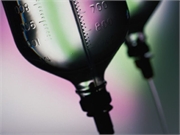- Could Your Grocery Store Meat Be Causing Recurring UTIs?
- Are You Making This Expensive Thermostat Error This Winter?
- Recognizing the Signs of Hypothyroidism
- 10 Strategies to Overcome Insomnia
- Could Artificial Sweeteners Be Aging the Brain Faster?
- Techniques for Soothing Your Nervous System
- Does the Water in Your House Smell Funny? Here’s Why
- Can a Daily Dose of Apple Cider Vinegar Actually Aid Weight Loss?
- 6 Health Beverages That Can Actually Spike Your Blood Sugar
- Treatment Options for Social Anxiety Disorder
In Small Study, Rheumatoid Arthritis Drug Appears to Help COVID-19 Patients

In the scramble to find medicines that beat back COVID-19, researchers from Italy report encouraging results from a small study on a rheumatoid arthritis drug already in use.
The drug, anakinra, may help quiet the runaway immune response known as a “cytokine storm,” which imperils some patients with severe COVID-19.
“Until a vaccine is available, we urgently need to find a way to help people survive the most severe symptoms of COVID-19, and to do that without overwhelming the intensive care capacity of hospitals,” explained study author Dr. Lorenzo Dagna in a news release from The Lancet Rheumatology. His team published the findings in the journal on May 7.
“A treatment [like anakinra] that has already met strict safety tests and that is available in sufficient quantities to meet the needs of the current pandemic is ideal,” said Dagna, who directs immunology and rheumatology at San Raffaele Hospital in Milan.
Most people with COVID-19 have only mild symptoms, but severely ill patients typically develop an immune system overreaction that triggers a storm of immune proteins called cytokines.
This cytokine “storm” contributes to hyperinflammation, leading to acute respiratory distress syndrome (ARDS) and reduced blood-oxygen levels. ARDS is the main cause of death in COVID-19 patients.
Could an anti-inflammatory drug such as anakinra help curb an out-of-control immune system?
To help find out, the new study tracked outcomes for 29 older, severely ill patients in Italy. These patients were treated with noninvasive ventilation (continuous positive airway pressure, or a CPAP machine), along with three experimental treatments.
Those treatments included the malaria drug hydroxychloroquine, antiviral medications lopinavir/ritonavir, and daily high-dose intravenous infusions of anakinra.
Outcomes for this group of 29 patients were compared to those of 16 similar patients who received the same care — except for the use of anakinra.
After three weeks, the addition of high-dose anakinra infusions was associated with reduced signs of cytokine storm and improved respiratory function in 21 (72%) of the 29 patients, the study found. Ninety percent (26 out of 29) survived; five (17%) required mechanical ventilation.
But most of the 16 patients who hadn’t received anakinra had persistent or recurring signs of cytokine storm. Respiratory function improved for half, and 56% (nine of 16) survived. One patient received mechanical ventilation (6%).
The Italian researchers emphasized that the study was observational and that randomized, controlled clinical trials are needed to fully assess anakinra’s effects in COVID-19 patients.
Anakinra is currently approved by the U.S. Food and Drug Administration to treat rheumatoid arthritis, an inflammatory arthritis known as Still’s disease and recurrent fever. The drug blocks inflammation-causing cytokine IL-1.
Dr. Amesh Adalja is senior scholar at the Johns Hopkins Center for Health Security in Baltimore. He reviewed the new findings and called them significant, saying they should prompt further investigation.
“It is important that this be studied in a randomized controlled fashion,” he said, adding that blocking IL-1 could prove to be an important aspect of caring for patients who have a hyperinflammatory state.
“There has been great interest in trying to modulate this inflammatory state with drugs that are approved for rheumatologic conditions,” Adalja said.
Study co-author Chiara Tassan Din, also from San Raffaele Hospital, noted that the patients studied were at an average age of 62, severely ill, and had underlying health conditions, putting them at high risk of death from COVID-19.
“Administration of high-dose intravenous anakinra in these patients, who were managed outside of the ICU in a setting overwhelmed by the COVID-19 pandemic and with a shortage of ICU resources, appeared to dampen systemic inflammation and was associated with progressive improvement in respiratory function,” Din said in the release.
Din noted viral control has been a focus of COVID-19 treatment so far, but the new research suggests controlling inflammation might be just as important.
Dr. Scott Canna, from the University of Pittsburgh Medical Center, wrote an editorial that accompanied the findings.
“In view of the biological plausibility of anakinra, the pharmacokinetic and safety profile of the drug, and a growing body of positive experience in autoinflammation and cytokine storm, these data are promising and support prioritizing this approach in the planning and enrollment of randomized controlled trials,” he wrote.
More information
The U.S. Centers for Disease Control and Prevention has more on COVID-19.
Source: HealthDay
Copyright © 2026 HealthDay. All rights reserved.










